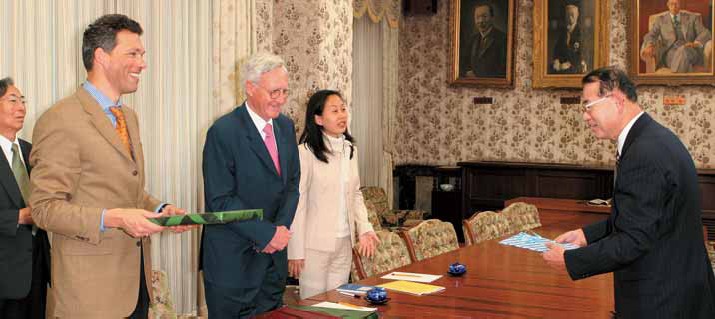
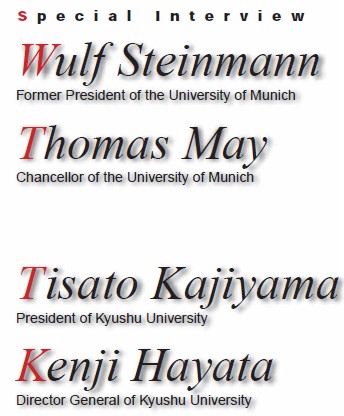 |
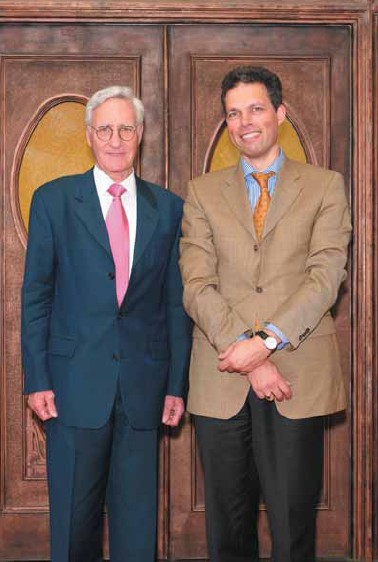
|
2004 marked the 20th anniversary of academic exchanges between the University of Munich and Kyushu
University. The faculty and staff members of both universities have supported the vigorous exchange activities
that have been carried out, including student and staff exchanges. Professor Steinmann (photo left),
former President of the University of Munich, is one of these staunch supporters and since his first visit to
us in 1988, he has consistently striven to promote exchanges with Kyushu University. When discussions turn
to the topic of education and research exchange, one can sense the undimmed passion despite his calm tone.
Mr. Thomas May, chancellor of the University of Munich (photo right) attended this interview with Prof.
Steinmann, and together with Dr. Tisato Kajiyama, President of Kyushu University and Mr. Kenji Hayata,
Director-General of the University, various ideas and opinions were exchanged on methods to incorporate
new perspectives into the mission of universities that todayfs age demands. This interview was chaired by
Masaharu Yanagihara, Vice-President of international affairs and student exchanges.
Cooperative agreement with Kyushu University gives rise to impressive results
Kajiyama: Thank you very much for taking the time to visit us today. As you have seen, the cherry blossoms are now in full bloom throughout the campus, but in fact, they are blooming much later than usual. You must have brought spring with you.
Steinmann: It has been exactly 17 years since I first visited Kyushu University, at the invitation by Mr. Ryohei Takahashi, the then-president of Kyushu University in 1988. I remember holding detailed discussions on matters related to both universities while touring the campus. I'm delighted that our relationship has remained so firm since then.
Looking back over the past 17 years, it is evident that exchanges have been actively promoted between both universities, not only at the student level but also at the faculty level. For the University of Munich, I am convinced that our cooperative agreement with Kyushu University has produced some impressive results.
May: This is my first visit to Japan, and I am thrilled to be able to visit Kyushu University.
Circumstances for Japanese and German universities changing with principles of competition
-For our first topic, I would like to address the issue of the changes affecting universities in Japan. In 2004, national universities became national university corporation and, as a result, we have seen numerous changes taking place. I would like to ask President Kajiyama about this issue.
Kajiyama: I think that, to put it briefly, the incorporation of universities exposed the fantasy of the university as an "ivory tower." The biggest change, however, was that the principle of competition was introduced to university management practices. As the embodiment of this change, Kyushu University initiated three reforms.
First, external experts were appointed to the joint management council. The second reform sought to enhance the level of awareness about the faculty, and based on consideration for who the beneficiaries are, the focus was shifted from education and research centered on the faculty to the students and the society to which students will become a part upon graduation.
The third important reform had to do with a shift in the decision-making structure of the university-shifted from each departmental faculty to the Board of Directors, with ultimate authority
invested in the president.
In the meantime, the university's research output and knowledge continues to be applied and the momentum for collaboration with the private sector has increased. The number of patents acquired has also increased rapidly. There are many more examples of visible changes like these.
Steinmann: Germany is in a very similar situation. However, speaking personally as an individual who is now outside the university scene, knowledge and learning will not be realized if research is tailored only to the demands of society. At the same time as conducting joint research with the private sector, professors must also pursue their own research, with ardent curiosity.
Kajiyama: If research is only directed at practical purposes, then the whole significance of universities is lost. I often tell the faculties, "I want you to perform genuine fundamental research." If the underlying research is genuine, it naturally leads to applications, which can be passed on to society.
-What are the thoughts of the university secretariat, which is responsible for practical matters concerning the university, in response to its incorporation?
Hayata: By contrast with provincial universities in Germany, which have enjoyed corporate status since their establishment, Japanese universities have undergone this shift relatively recently. Because of this, accounting and decisions related to personnel, for example, were bound by the same logic and rules as the administrative organizations. This is where universities have run into problems trying to accomplish their new mission.
On the one hand, the university's decision-making power has certainly increased through incorporation; however, at the same time, personnel salaries and research costs are areas that must now be covered through our own initiatives.
May: One third of the overall budget of the University of Munich is financed by outside capital.
Just as demands have been placed on national government employees to demonstrate visible results, the University of Munich also demands the same of its staff, such that the salaries of some staff are paid according to the results achieved under the new system. This system has been introduced to serve them with an incentive and thus far, the results seem to have been impressive.
- Tuition fees seem to increase almost every other year. What is the situation in Germany?
May: In Germany since the 1960s, the tuition system was abolished. However, because provincial governments have decided to re-introduce this system, we will also be required to incorporate this policy from next summer.
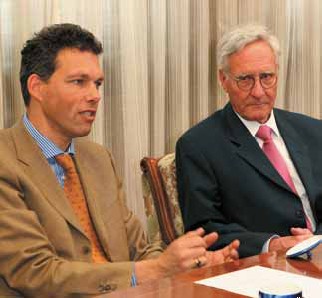 |
Steinmann: During the 12 years I worked as president of the university, I endeavored to reintroduce tuition fees basically because students would enter university with no appreciation of its value. In Germany, we have a saying - |
Focusing on the declining birthrate and diversity in universities
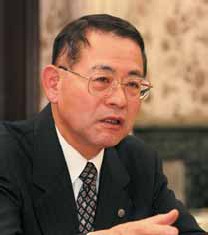 |
- Next, I would like to ask about the falling birthrate and maintaining the quality of the student body. With the decrease in number of 18-year-olds in Japan, the "2007 issue," where the potential number of people who wish to enter university and the number of students universities can accept are the same, will become a worry.
Kajiyama: To put it succinctly, we will enter an era where anyone that wishes to can enter university at any time. Under such circumstances, retaining a high standard of students becomes increasingly difficult, and I believe it will present a serious problem. Therefore, Kyushu University is working to increase the number of quality exchange students from overseas, offering life-long learning courses and specialist courses at graduate schools, such as law school for people who have already graduated. |
May: In Germany, it is forecast that the number of university students will continue to grow until 2012, after which it will start to decline. Our university is quite large and has close to 50,000 students; therefore we are facing a similar problem to Kyushu University in maintaining student quality. To this end, we limit the number of students entering the university based on high school examination results (Abitur), conduct aptitude tests, and check to determine whether a student is suited to the specialized field they wish to pursue.
Of course, we also place considerable emphasis on the highquality education received after entering the school. In addition, as Mr. Kajiyama said earlier, the University of Munich is also vigorously promoting the acceptance of quality exchange students and conversely, dispatching our own students to prominent universities overseas. Lectures conducted in English have increased in accordance with international standards, and departments offering "Bachelor degrees" as in the United States and
Britain have also increased.
However, in the midst of these advancements, we must not forget to maintain the essence and originality of the university, and have made efforts not to damage the character of the university.
Contact with international society at a young age
- At the same time, the individuality of universities is just as essential as internationalism. President Kajiyama, could I ask you to explain the "Focusing on Asia" as the international strategy of Kyushu University?
Kajiyama: This is not simply a focus on Asia alone. Developing state-of-the-art science and technology is simply healthy competition with other universities around the world, including Europe
and North America.
However, compared to the already mature educational system and culture in Europe and North America, Asia is still in the midst of a whirlpool of change. If insufficient attention is paid to the rapid pace of change in science and culture in Asia, Japan will be left behind. That is the meaning behind the idea of the "Focusing on Asia."
May: Sixty percent of graduate students at top universities in the United States are from overseas, and I have heard that a large number of those students are from Asia. If these students return to Japan, or graduate students from the U.S. come to Kyushu University, I think that this is an important factor in increasing the quality of students.
Steinmann: I feel that it is very important to have many educational partners in different countries, as I did when I was acquainted with the teaching staff at Kyushu University 17 years ago. In particular, it is meaningful for students - while they are young - to visit different countries and get ideas and impressions about other people, lifestyles, and national sentiments. This kind of inspiration can have a major impact on their later lives.
Awareness-raising requested of office staff
- Finally, what is Kyushu University's approach to training for office staff, who undertake the management of the university?
Kajiyama: With the shift from its designation as a national organization to a corporate body, it was necessary for the university to reconfigure its modus operandi into a more efficient and substantial entity-similar to how business is conducted in the private sector. This is where I began promoting the "5S campaign": senmonsei (specialty), sekinin (responsibility), senkensei (foresight), supiido (speed), and shinrai (trust). I feel that recently, as a result of this campaign, office work has become more reliable and quick.
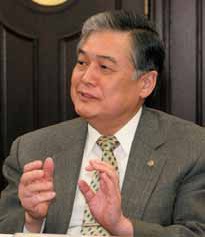 |
Hayata: There were also changes in the roles and work content of the office staff. Upon incorporation, measures were necessary to clarify the individuality and originality of the university from various perspectives. Since last year, Kyushu University has been implementing staff training in new and innovative ways and is having staff learn the techniques and concepts employed in the private sector by dispatching them to work at department stores, electric companies, and communications companies. In addition, in order to acquire a sense of how things are done at the international level, staff are sent to universities overseas that have cooperative agreements with Kyushu University. If possible, we would like to send some staff members to the University of Munich this year. |
- May I ask you for a message to our students and young researchers?
Steinmann: When I entered the University of Munich in 1951, Germany had yet to recover from its defeat during the war and the future seemed hopelessly unstable, with the Korean War and other international issues. However, because even those terrible times improved, I think it was possible to be optimistic and find pleasure in life. Now, we enjoy a high standard of living and worry about losing that. As a result, stresses appear in various forms and each country is now tinkering with structural reform. But what face will these reforms take in our future society? That has been entrusted to the younger generation.
The students and young researchers here at Kyushu University are at one of Japan's best universities. I want you to hone your skills. I want you to be inspired and moved by your studies. I want you to look hard and square at the world and never let your gaze waver from your objective. I want you to build your lives with a belief in the future and find solutions to problems while living life to the full.
Previous PageTop Next

